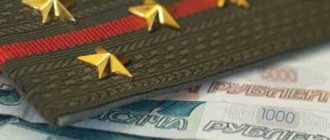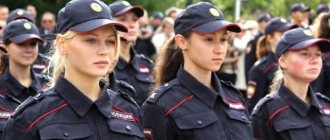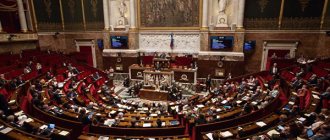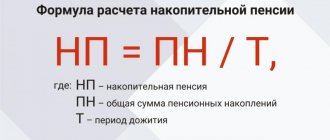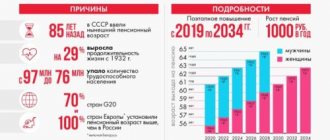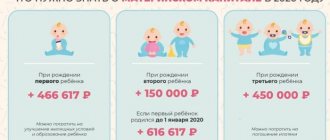When indexation was canceled for working pensioners
This happened in 2020. Those elderly citizens of Russia who retired in 2020 or earlier and have been working in recent years receive a pension at the same level as three years ago. All indexations that were carried out from 2020 to 2020 did not affect them.
In Russia, about ten million pensioners continue to work after retirement. Freezing pensions for such people gives the country's budget significant savings. The only question is whether this is an acceptable source of savings.
This material was stolen from the site. It happens. Most likely, the stolen version is missing a lot of the information you need. For example, useful links in the article. Visit www.newsment.ru to read the original article and find lots of other useful information!
A new type of pension for children whose both parents are unknown
On January 1, 2020, a new type of payments to so-called “foundling children”, that is, children whose parents are unknown, came into force. This measure was taken in order to put abandoned children on the same level as other orphans who can receive pensions. At the moment, the pension amount is 10,068 rubles and is paid monthly. From April 1, 2020, it will be indexed by 2.9% and will already amount to 10,359 rubles.
The state tries to annually index all possible types of pensions for certain categories of citizens, but the budget does not always have funds for this. In some cases, you can get by with federal or regional additional payments, in others, indexation is simply frozen for several years.
In any case, the government is constantly introducing new types of additional payments and compensations that allow pensioners to live at a more or less acceptable level.
How much do working pensioners lose in 2020 due to pension freezes?
Calculating this amount is not so difficult. Since 2020, Russia has undergone three indexations of old-age pensions:
- 2016 – by 4%,
- 2017 – by 5.8%,
- 2018 – by 3.7%.
Thus, if an elderly resident of Russia was already a pensioner in 2020 and has continued to work since the same year, then for every thousand rubles of his pension, he should have received another 141 rubles based on the results of three indexations.
That is, if such a person’s pension today is equal to 10,000 rubles, then if indexation were carried out, it would already be equal to 11,410 rubles. A pensioner loses almost one and a half thousand rubles every month due to freezing.
Of course, if a pensioner got a job in 2020, and his pension was recalculated in 2016, the results will be slightly different. As is the case with those pensioners who retired after 2016. But the general meaning becomes better understood when you deal with specific numbers.
Yes, the pensions of working pensioners increase slightly due to additional length of service (more on this below), but such an increase turns out to be very insignificant and can be neglected in our example.
On increasing pensions in 2020
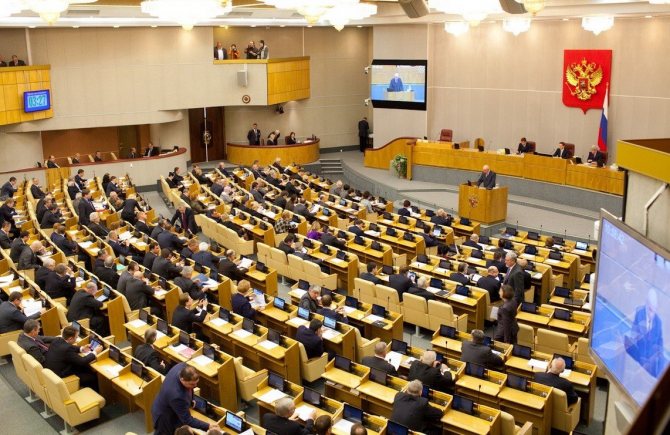
Based on the results of the spring session of the State Duma, in the field of social protection of citizens, an amendment to the law on the subsistence level was adopted, according to which the monthly supplement to pensions up to the subsistence level is not subject to revision in connection with the indexation of pensions. This law applies only to non-working pensioners. In addition, the procedure for paying indexations has been determined.
Employed pensioners are subject to a moratorium on indexation, valid from the beginning of 2020 to the end of 2020.
It is expected that the moratorium will be extended until December 31, 2024. The arguments in favor of making such a decision were the regular increase in salaries. According to the Ministry of Finance, wages grew faster than pensions. In addition, a working pensioner has more benefits. In particular, the right to a tax deduction.
In general, it is better protected, and the state decided to save on indexations for employed pensioners, in order to increase their amount for other categories of elderly people. Despite this, payments to employed pensioners will increase from August 1, 2020.
Pensions for working pensioners will remain frozen in 2020
All indexations that were planned for 2020 have already been completed. Thus, in January, old-age pensions for non-working pensioners, as well as military pensions, were increased. Social pensions were recalculated in April.
These are all indexations of pensions that are prescribed in the 2018 budget.
Of course, you need to keep in mind that only old-age pensions for working Russians are frozen. If a person receives a social pension and works at the same time, such payment will be indexed in any case.
How much will the survivor's pension be?
If a child has lost one or two parents, he is entitled to a survivor's pension.
Its current amount is: 5,240 rubles if one parent died and 10,481 rubles if both. From April 1, 2020, survivor pensions will be indexed by 2.9%.
Families of deceased military personnel can receive a separate type of survivor's pension.
After the last indexation in 2020, the amount of the social pension is 5,034 rubles. At the same time, it can be increased:
- 40% - a military man died from a disease acquired during work;
- 50% - the military man died from injuries during work;
- 150% - the military man died from an illness during his service;
- 200% - died from military trauma.
Indexation of pensions for working pensioners in 2020 is possible only in one case
This case is the dismissal of a pensioner from work, at least formally. After leaving the workplace, the person’s pension will be recalculated taking into account all those indexations that did not affect him due to the freeze.
That is, if we take a conditional pensioner from the example above with a pension of 10,000 rubles, who retired before 2020 and worked in recent years, then his pension will automatically increase to 11,410 rubles, which we received as a result of our calculation.
It is important to know that in 2020 the scheme for recalculating the amount of pensions in this case has changed!
Until the end of 2020, pensions were recalculated only three months after dismissal due to some peculiarities of accounting in organizations and the timing of submitting reports on employees to the Pension Fund of the Russian Federation. In 2020, recalculation follows the dismissal starting from the next month. However, the pensioner will receive the money in his hands after the same three months.
Let's figure out how it works:
- Let's assume that the pensioner retired in May 2020 (no matter what date).
- Since June, according to the law, he has been entitled to a higher pension, taking into account indexation. But the Pension Fund does not know about this yet.
- In June, the organization where the pensioner worked submits reports to the Pension Fund for May, where the pensioner is still registered as an employee. Even if he only worked for one day.
- In July, new reports are received - for June. There is no longer a pensioner as an employee. The Pension Fund understands that the pensioner should undergo indexation, since he no longer belongs to the category of workers.
- In August 2020, the pensioner receives a higher pension, which is recalculated taking into account all missed indexations, as well as the difference between the new and old pension amounts for June and July.
If we return to the conditional pensioner from our example, who received exactly ten thousand rubles in pension, then after dismissal he will receive the same 10,000 rubles for another two months. In the third month, he will already receive 14,230 rubles. This is 11,410 rubles - his new pension, as well as 1,410 rubles for the previous two months. Then the pensioner will receive his 11,410 rubles and will be subject to all indexation of old-age pensions as a non-worker.
In connection with the described feature, it is important for a pensioner to correctly plan the time of dismissal. It's better to do this at the end of the month rather than at the beginning of the next. Then in the next month he will be entitled to indexation of his pension.
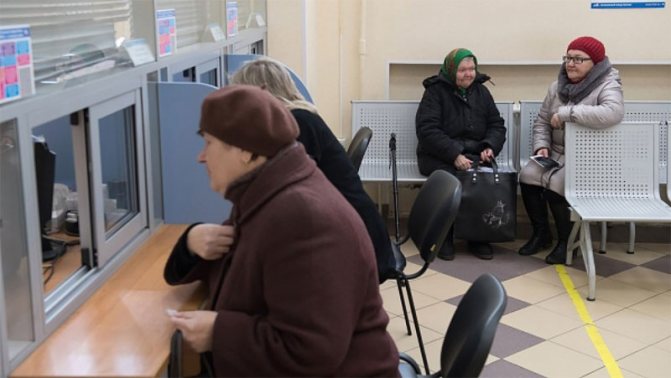
Latest news and latest changes in pensions
As has already become clear, the increase in pensions in the new year for most categories of pensioners will be very small (unnoticeable) or, as for a large category of working pensioners, there will be no increase at all. But in the new year, the requirements for already formed pension rights and the level of wages of Russian citizens for retirement will increase:
- The minimum requirements required for retirement in 2020 will increase by the planned values provided for by the Law “On Insurance Pensions” - now for this you will need to have at least 9 years of work experience and at least 13.8 pension points .
- It will become much more difficult for the working population to earn new pension points from 2018 , since the maximum base for calculating insurance contributions to the Pension Fund in 2018 (on the basis of which points earned for the year are calculated) will be increased immediately by 16.55% - from 876 thousand. rubles up to 1 million 021 thousand . - according to Government Decree No. 1378 of November 15, 2020. And it’s unlikely that anyone in Russia now has a salary that is growing at the same rate (well, if it’s growing at all).
No other significant changes are expected in the Russian pension system in 2018. In particular, the expected one-time payment to pensioners in the amount of 5,000 rubles will not be paid in 2020 - it was a one-time, one-time additional payment that was due to all pensioners in January 2020 in return for the additional indexation required by law that was missed in 2020 (and there is no reason to pay it in 2018, simply not).
And one of the few truly good news for Russians is that no decision has yet been made to increase the retirement age, which is important for those who are still working or planning to retire (including men born in 1958 and women born in 1963).
Will there be a one-time payment of 5,000 rubles to pensioners in 2018?
At the beginning of 2020, recipients of all types of pensions, regardless of the fact of work, received an additional payment of 5,000 rubles. This measure was necessary in the current economically unstable situation.
Against the backdrop of high inflation and the impossibility of carrying out additional indexation of pensions in 2020, a decision was made to make a one-time payment to citizens’ pensions (Law No. 385-FZ of November 22, 2016). Thus, the pensions of Russians were “conditionally re-indexed”, many of whom perceived this simply as a New Year’s gift.
Currently, according to the Government, the economic situation in the country is normalizing. Over the past 12 months, the increase in consumer prices (inflation) does not exceed 3%, and pensions in 2017 rose in total according to two indexations by 5.78%.
The upcoming indexation of 3.7%, planned for January 2018, exceeds the inflation rate for 2020. Therefore, no additional one-time payments (5 thousand rubles or any other) in addition to the already included indexations will be made!
Will there be an increase in the retirement age in 2020 (latest news)
In the last few years, the most discussed and pressing issue for Russians is the issue of increasing the retirement age . In many other countries, including post-Soviet ones, corresponding decisions have already been made and are being implemented.
- For example, from January 2020 in Belarus the retirement age will be increased annually by six months until women reach 58 years of age and men reach 63 years of age. In Kazakhstan, the same values apply - for women at 58 years old, for men at 63 years old.
- In many developed countries, such as Germany, men become pensioners at 65 years old, and women at 60 years old.
- In Ukraine, the Verkhovna Rada adopted a law on pension reform, which also included an increase in the current retirement age. Now this issue has come to a head in Russia. According to the Government, it is primarily due to the fact that the working age in the country is increasing - i.e. About a third of Russians already stop working later than retirement.
However, due to the great unpopularity of this measure, the Russian Government has not yet made a final decision on extending the retirement age (although many consider this issue resolved and note that it will most likely begin to be implemented after the next presidential elections, which will be held in March 2020 - but so far these are only rumors ).
How many points and work experience do you need to retire in 2018?
Since 2020, a point system for calculating labor (insurance) pensions for citizens has been in effect, in which insurance premiums paid to the Pension Fund by the employer for its employees are transferred from rubles to relative values (points). The amount of contributions taken into account for the year is correlated with the maximum accountable amount of contributions approved by the Government, which corresponds to 10 pension points (this is the maximum that can be received in one year).
But to obtain the right to an old-age pension within the generally established time frame, three mandatory conditions must be met:
- reaching the age established by law;
- availability of insurance (work) experience;
- the presence of an established value of the individual pension coefficient (IPC) or, in other words, the size of pension points.
It should be noted that this only applies to old age pensions! Other types of pensions for compulsory pension insurance (disability, survivors) are assigned regardless of the length of work (insurance) experience and the number of points received.
Since 2020, a mandatory condition for granting a pension upon reaching retirement age (currently 55 years for women and 60 years for men) is the presence of 9 years of experience and 13.8 points of the individual pension coefficient (IPC).
An example of calculating pension points from 2020 to 2020
For a man born in 1965, he has an official salary before income tax (NDFL) of 30,000 rubles (accordingly, annual earnings are 360,000 rubles). Let’s assume that this citizen’s salary has never increased since 2020. At the same time, deductions are not made for him to the funded part of the pension, since he was born before 1967. Thus, the employer pays insurance premiums for this man to an individual personal account in the amount of 16% of earnings before personal income tax - that is, 16% × 360,000 = 57,600 rubles per year. Let's calculate how many points this man has earned since 2020, when the new pension formula came into effect.
Every year, for these purposes, the Government approves the so-called maximum wage , the amount of mandatory contributions from which to the Pension Fund of the Russian Federation to a citizen’s individual personal account is 16%. Thus, the maximum established salary in the country from 2020 to 2020 is the following values (see table below).
In August 2020, pensions for working pensioners will increase. Maximum 245 rubles
August is the traditional month when working pensioners receive a slight increase in their pensions. This happens due to the fact that the person worked for another year and earned additional pension points.
Unfortunately, the state has set a maximum number of points that a working pensioner can receive, namely three points. In 2020, one pension point costs 81 rubles 49 kopecks. Thus, even in the most favorable scenario, when a person receives a fairly high salary, he will receive an increase in pension in the amount of no more than 244 rubles 47 kopecks. For most, the amount will be less.
Increase in military pensions from February 1
Every year, according to the law, military pensions and salaries are indexed on February 1. Payment increases have been frozen for several years. In 2020, changes were made to pensions: firstly, they were indexed by 4%, and secondly, this happened not on February 1, but on January 1, along with an increase in insurance pensions.
In addition, an annual increase in the reduction coefficient is provided, according to which pension provision can also be calculated. Usually it increases by 2% and the state plans to increase it to 100%, while now it is 73.23%. This year the reduction factor remained unchanged.
Additional payment to military pensioners of 2,500 rubles in 2020
Since the beginning of 2020, rumors have been actively circulating that the military will be given an additional payment of 2,500 rubles monthly, but the information was only partially confirmed. Firstly, the additional payments will affect only a third of elderly military personnel, and secondly, the amount will depend on rank.
Recalculation and amount of increase for working pensioners

In August 2020, the pensions of working pensioners will be recalculated depending on the amount of salary they receive and, accordingly, the amount of insurance contributions.
The pension of working pensioners directly depends on the amount of insurance premiums paid for them to employers, an indicator of which is the so-called pension points. The law limits the possible increase in pension to three pension points, which, as mentioned earlier, will be approximately 262 rubles.
Please note: for working pensioners, it has become possible to suspend receiving a pension, and after dismissal, receive it with an increased coefficient, calculated using a special formula. However, this option has so far been chosen by a very small number of pensioners, due to the traditional distrust of elderly (and not only) citizens in the state apparatus.
Budget funds to increase pensions in the new year
The allocation of money for pension payments in Russia falls under the competence of the State Duma.
The law “On the budget of the Pension Fund of the Russian Federation for 2020 and for the planning period of 2021 and 2022”, adopted in November 2020, provides 8,635 trillion rubles for the payment of insurance and social pensions.
At the end of 2020, deputies from the LDPR faction submitted to the State Duma a bill providing for the indexation of pensions for working pensioners. The project received a negative review from the Government - the ministers decided that there was simply no money in the budget for its implementation. Result: The decision of the State Duma was negative - not to adopt this law.
At the same time, some deputies from the United Russia faction did not rule out the possibility of returning indexation for certain categories of working pensioners, such as disabled people, public sector employees and those who receive too little salary.
Also, the deputies who voted against the adoption of this law referred to international experience. In the vast majority of developed countries, working pensioners do not receive a pension at all, which is consistent with the relevant convention of the International Labor Organization, which defines a pension as an insurance payment in the event of loss of wages.
Employment and indexation
Let us recall that from 2020 the indexation of insurance pensions and fixed additional payments to them for working pensioners was cancelled. The cancellation of indexation does not apply to those who receive social pensions or state pensions.
When a pensioner stops working, the pension is paid to him taking into account all indexations that took place during the period of his working activity.
If he starts working again, the size of the pension does not decrease. The fact of the pensioner's labor activity was established by the Pension Fund on the basis of reports provided by the employer on a monthly basis.
Notification to the Pension Fund of the Russian Federation about termination of labor activity by a pensioner
As already mentioned, information about the work activities of pensioners in the Pension Fund is provided by the employer. In this case, the pensioner does not need to personally notify the Pension Fund of his dismissal, although he retains such a right. As for the self-employed population, in accordance with the Federal Law “On Compulsory Pension Insurance in the Russian Federation”, in the event of termination of work, the pensioner is obliged to independently provide information about this to the Pension Fund of the Russian Federation.
Pensioners living in territories exposed to radiation as a result of the Chernobyl nuclear power plant disaster are required to immediately, in accordance with the law “On social protection of citizens exposed to radiation as a result of the Chernobyl nuclear power plant disaster,” report to the local Pension Fund of Russia about the implementation or termination of their labor activity, so how this fact affects the monthly payment due to them.
Thus, despite the fact that in August payments to working pensioners will be increased, they will be indexed only at the level of inflation and no tangible changes will occur. It is still unknown what decision the Government will make regarding further payments.
News about what ministers decide regarding the relative pension financing of citizens appears frequently. The Russian authorities are discussing whether indexation will continue and whether allowances for public sector workers will be removed in the future. But there is nothing currently talking about cutting payments to working pensioners.

